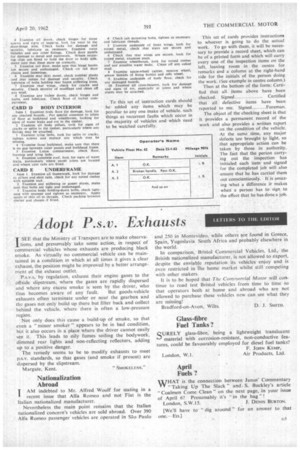Adopt P s v. Exhausts
Page 55

If you've noticed an error in this article please click here to report it so we can fix it.
T SEE that the Ministry of Transport are to make observa tions, and presumably take some action, in respect of commercial vehicles whose exhausts are producing black smoke. As virtually no commercial vehicle can be maintained in a condition, in which at all times it gives a clear exhaust, the position might be improved by a better arrangement of the exhaust outlet.
P.s.v.s. by regulation, exhaust their engine gases to the _offside slipstream, where the gases are rapidly dispersed and where any excess smoke is seen by the driver, who
thus becomes aware of any fault. But goods-vehicle exhausts often terminate under or near the gearbox and the gases not only build up there but filter back and collect behind the vehicle, where there is often a low-pressure region.
Not only does this cause a build-up of smoke, so that even a "minor smoker" appears to be in bad condition, but it also occurs in a place where the driver cannot easily see it. This leads to oily fumes soiling the bodywork, dimmed rear lights and non-reflecting reflectors, adding up to a positive danger.
The remedy seems to be to modify exhausts to meet p.s.v. standards, so that gases (and smoke if present) are dispersed by the slipstream.
Margate, Kent. SMOKELESS."
Nationalization Abroad
AM indebted to Mr. Alfred Woolf for stating in a recent issue that Alfa Romeo and not Fiat is the Italian nationalized manufacturer.
Nevertheless the main point remains that the Italian nationalized concern's vehicles are sold abroad. Over 390 Alfa Romeo passenger vehicles are operated in So Paulo arid 250 in Montevideo, while others are found in Greece, Spain, Yugoslavia South Africa and probably elsewhere in the world.
In comparison, Bristol Commercial Vehicles, Ltd., the British nationalized manufacturer, is not allowed to export, despite the enviable reputation its vehicles enjoy and is even restricted in the home market whilst still competing with other makers.
It is to be hoped that The Commercial Motor will continue to road test Bristol vehicles from time to time so that operators both at home and abroad who are not allowed to purchase these vehicles new can see what they arc missing!
Bradford-on-Avon, Wilts. D. J. SMITH.
Glass-fibre Fuel Tanks ?
sURELY glass-fibre, being a lightweight translucent material with corrosion-resistant, non-conductive features, could be favourably employed for diesel fuel tanks? F. JOHN KEMP,
London, W.I. Air Products, Ltd.
April Fuels ?
WHAT is the connection between Janus' Commentary "Taking Up The Slack" and S. Buckley's article "Coalmen Come Clean" on the next page, in your issue of April 6? Presumably it's in the bag " !
London, S.W.15. J. DENis BURTON. [We'll have to dig around" for an answer to that
one.—ED.]
















































































































